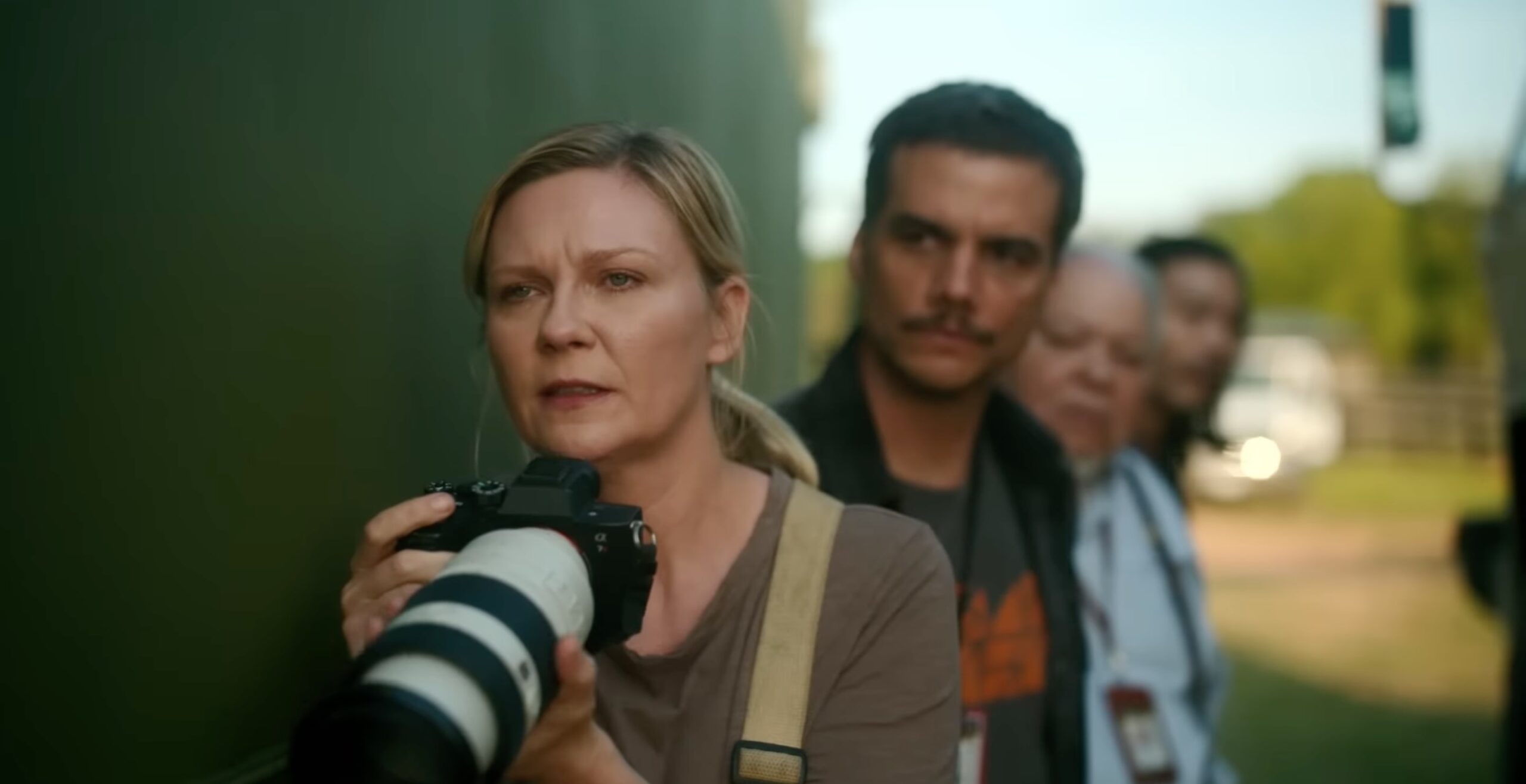SUMMARY
This is AI generated summarization, which may have errors. For context, always refer to the full article.

In Alex Garland’s (Ex Machina, Annihilation) new dystopian epic, there is a war shrouded in ambiguity. In fact, Civil War may not even be about war in the way it has been advertised.
Its lack of a militaristic point of view is only rivaled by its tendency to avoid political specificity.
A civil war, characterized as a nationwide conflict, finds the newly allied California and Texas pitted against the loyalist states supporting the incumbent president, who is suggested to be a power-hungry dictator.
While there could easily be a novel’s worth of backstory explaining why Democrat-dominated California would ally with Republican stronghold Texas, or why Nick Offerman’s unnamed president character is serving a third term, these details are merely superficial. They are bones thrown to the marketing department to make the film more enticing.
Because if Civil War was packaged as a rumination on how photojournalism is transformed in areas of conflict, it likely wouldn’t have secured the substantial opening weekend it just enjoyed under the A24 banner. War sells. Neutrality sells.
Garland says he wanted to make an “anti-war” film and avoid the pitfalls of previous epics like Apocalypse Now, which ended up romanticizing what it protested against. His approach to doing so was to center it on four journalists traveling to Washington, DC, jockeying for a chance to interview the president before the White House is stormed by the secessionists. So now the question becomes: does journalism sell?
The shadow of neutrality
“Once you start asking those questions, you can’t stop. So we don’t ask. We record so other people ask,” says Lee, a veteran photojournalist played by Kirsten Dunst, who is perfectly cast in this role due to her ability to express her witheredness with just a simple look. She says this line to Cailee Spaeny’s Jessie, a young and aspiring journalist who unexpectedly tags along on their dangerous quest.
The question highlights journalism’s role in wartime, a period when death and democracy frequently share the same sentence. Here, the “objective truth” of a photo reveals more about its viewers than about its creator. Are journalists just supposed to be empty vessels? To be neutral in a conflict to increase the chances of surviving to live another day? Would it be better coverage if they point a camera at war crimes rather than the real heart of the conflict?
In a tense scene involving Jesse Plemons, who is always a delight, these journalists are faced with those exact questions. Plemons represents the terror of unchecked power, sneering at those he deems “un-American” and sifting through bodies with menacing precision. He coerces the protagonists to answer who they are, declare their allegiances, and define their roles within the war. They can no longer hide in the shadow of neutrality.
In this exchange is the ethical quandary that makes Civil War conceptually fascinating. In the context of a decaying society, what do we expect of our truthsayers? Is bringing the world’s attention to brutality enough? It’s clear that what is being done is not enough, and the implied horror is that this is the path we’re currently undertaking.
Civil War asks whether photojournalism can enact change or just breed ruthlessness during times of conflict. It’s about how each photograph, if misguided, can numb murder and insurrection – how it makes us not feel rather than feel. There are scenes in the final act of this film littered with visual breaks that espouse the power of images to mark moments of history. It’s expressed through intercuts that intentionally break the pacing of scenes, lacerating sound from the edit and letting each still photo express the full context of the moment.
The question of humanity
But while Civil War is adept at showcasing how war rips away the humanity of journalism, it falters in expressing how that humanity is lost in its other aspects. The military is still portrayed as a monolithic force, which leads to armed forces being driven by an oversimplified clash between liberalism and authoritarianism. However, the film complicates these alliances (recall how Texas and California are unexpectedly allied together), leaving the audience unable to conclusively draw what is truly at stake.
Perhaps that is precisely the point: there are no true winners when two sides are fighting each other, only dead soldiers and journalists. This is a noble message, if only it hasn’t already been said before, and better. The film uses its pomp and circumstance as a shield, avoiding a clear expression of its core message. Rather than allowing the war to fade into the background, it does the opposite: the conflict becomes a distraction that overshadows and diminishes the human elements it seeks to explore.
I can talk about how riveting the action sequences are, how each needle drop adds a touch of cynicism to the bloodshed we just witnessed. But doing so would be to surrender to the weaker film orbiting around the much stronger one. It’s striking how after the film’s most intense moment, it manages to uncork bottled-up emotions from the brilliant acting of Spaeny and Wagner Moura. Yet, this emotional release is quickly repressed to make room for the climactic final battle, returning to the familiar territory of guns and glory.
Civil War is not a bad film, but it suffers from an identity crisis. It tries to appeal to both sides, but in the same breath presents a story about the untold cost of war that is unquestionably between perpetrators and victims. Instead of offering a distinct and haunting portrait of our future, it creates a hypothetical playground where its ideas hover in abstractness rather than flesh and blood. – Rappler.com
‘Civil War’ is showing in Philippine cinemas nationwide.
Add a comment
How does this make you feel?
There are no comments yet. Add your comment to start the conversation.